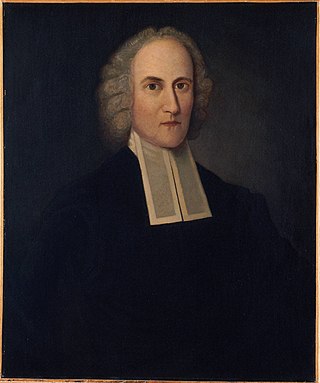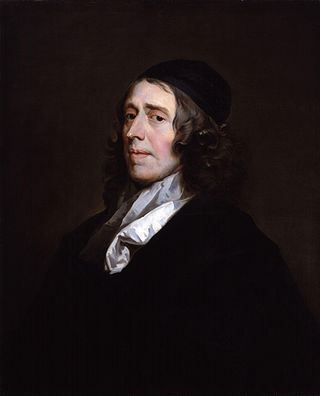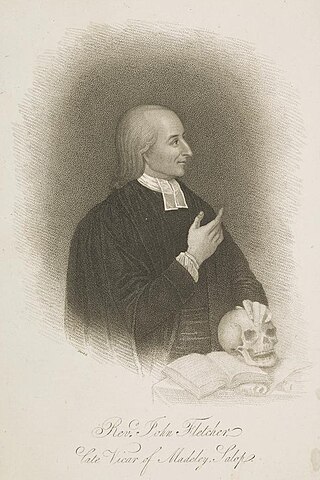Related Research Articles

Lancelot Andrewes was an English bishop and scholar, who held high positions in the Church of England during the reigns of Elizabeth I and James I. During the latter's reign, Andrewes served successively as Bishop of Chichester, of Ely, and of Winchester and oversaw the translation of the King James Version of the Bible. In the Church of England he is commemorated on 25 September with a lesser festival.

John Wesley was an English cleric, theologian, and evangelist who was a leader of a revival movement within the Church of England known as Methodism. The societies he founded became the dominant form of the independent Methodist movement that continues to this day.

Jonathan Edwards was an American revivalist preacher, philosopher, and Congregationalist theologian. Edwards is widely regarded as one of America's most important and original philosophical theologians. Edwards' theological work is broad in scope but rooted in the paedobaptist Puritan heritage as exemplified in the Westminster and Savoy Confessions of Faith. Recent studies have emphasized how thoroughly Edwards grounded his life's work on conceptions of beauty, harmony, and ethical fittingness, and how central the Age of Enlightenment was to his mindset. Edwards played a critical role in shaping the First Great Awakening and oversaw some of the first revivals in 1733–35 at his church in Northampton, Massachusetts. His theological work gave rise to a distinct school of theology known as New England theology.

Charles Haddon Spurgeon was an English Particular Baptist preacher.

John Potter was Archbishop of Canterbury (1737–1747).

John Owen was an English Nonconformist church leader, theologian, and academic administrator at the University of Oxford.

John Frederick Denison Maurice (1805–1872), known as F. D. Maurice, was an English Anglican theologian, a prolific author, and one of the founders of Christian socialism. Since the Second World War, interest in Maurice has expanded.

John of Ávila was a Spanish priest, preacher, scholastic author, and religious mystic, who has been declared a saint and Doctor of the Church by the Catholic Church. He is called the "Apostle of Andalusia", for his extensive ministry in that region.

Jared Sparks was an American historian, educator, and Unitarian minister. He served as President of Harvard College from 1849 to 1853.

António Vieira was an Afro-Portuguese Jesuit priest, diplomat, orator, preacher, philosopher, writer, and member of the Royal Council to the King of Portugal.

Andrew Fuller was an English Particular Baptist minister and theologian. Known as a promoter of missionary work, he also took part in theological controversy.

John William Fletcher was a Swiss-born English divine and Methodist leader. Of French Huguenot stock, he was born in Nyon in Vaud, Switzerland. Fletcher emigrated to England in 1750 and there he became an Anglican vicar. He began to work with John Wesley, becoming a key interpreter of Wesleyan theology in the 18th century and one of Methodism's first great theologians. Fletcher was renowned in Britain for his piety and generosity; when asked if he had any needs, he responded, "...I want nothing but more grace."
Bela Bates Edwards (1802–1852) was an American man of letters.
Pelbartus Ladislaus de Temesvár was a Franciscan writer and preacher.

Peter Sterry was an English independent theologian, associated with the Cambridge Platonists prominent during the English Civil War era. He was chaplain to Parliamentarian general Robert Greville, 2nd Baron Brooke and then Oliver Cromwell, a member of the Westminster Assembly, and a leading radical Puritan preacher attached to the English Council of State. He was made fun of in Hudibras.

Samuel Miller was a Presbyterian theologian who taught at Princeton Theological Seminary.

The French Reformer John Calvin (1509–1564) was a theological writer who produced many sermons, biblical commentaries, letters, theological treatises, and other works. Although nearly all of Calvin's adult life was spent in Geneva, his publications spread his ideas of a properly reformed church to many parts of Europe and from there to the rest of the world. It is especially on account of his voluminous publications that he exerts such a lasting influence over Christianity and Western history.
John de Crannach was a 15th-century Scottish scholar, diplomat and prelate. Originating in the north-east of Lowland Scotland, he probably came from a family associated with the burgh of Aberdeen. Like many of his relatives, he flourished in the 15th-century Scottish church. After just over a decade at the University of Paris, Crannach became a servant of the then Dauphin Charles (VII).
Robert Wilson Evans was an English cleric and author, Archdeacon of Westmorland from 1856 until the year before his death a decade later.
Nicholas Bayard was a Dominican theologian.
References
![]() This article incorporates text from a publication now in the public domain : "Felton, John (fl.1430)". Dictionary of National Biography . London: Smith, Elder & Co. 1885–1900.
This article incorporates text from a publication now in the public domain : "Felton, John (fl.1430)". Dictionary of National Biography . London: Smith, Elder & Co. 1885–1900.